Probiotic Foods You Need in Your Diet
Not all bacteria is bad, some of it is necessary for your internal digestive health. Do you know the probiotic foods you need in your diet?

Do you know all the probiotic foods you need in your diet? Normally the idea of bacteria makes people uncomfortable. We have all of these soaps, wipes, and disinfectants we can stash in our purses and backpacks for the specific purpose of killing bacteria. But anyone who’s sat through an introductory level biology class will remember that we can’t actually kill off all of the bacteria in the world. We need some of it in our intestinal lining to promote healthy digestive processes and keep our lives running smoothly. Frequently, we get ourselves off track in terms of growing healthy bacteria by eating foods that aren’t so great for us, or overloading on antibiotics. Luckily, there are food options out there, probiotic foods, that you need in your diet to help regulate your digestive system.
Yogurt

Yogurt is probably the most popular probiotic food out there. One serving of yogurt can give you up to tens of billions of the helpful bacteria that help your gut run smoothly. To make sure that the bacteria survive on the shelf at the store, the cultures of bacteria are added after the milk has been pasteurized. While some yogurts are specifically designed to be aid digestion, any yogurt with a live and active culture listed as an ingredient can help promote individual health. Yogurt has been associated with helping ease symptoms of gas, diarrhea, and other digestive problems related to gut imbalance. Your best options for yogurt choices are those that come from goat or sheep milk, are from grass-fed sources, or are organic.
Kefir
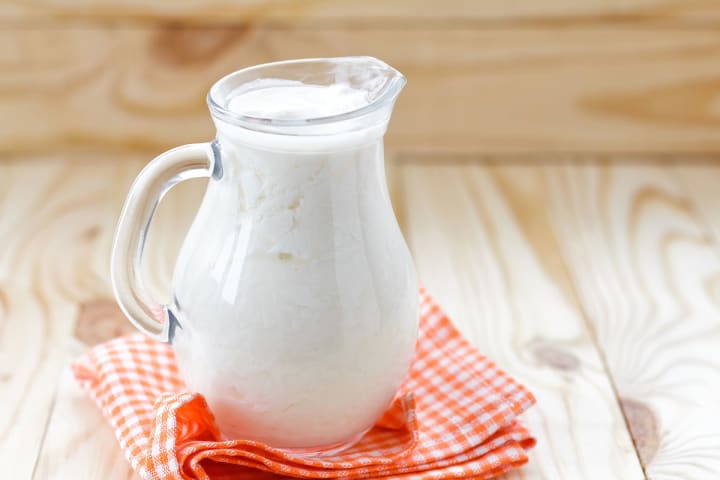
Similar to yogurt, kefir is a fermented dairy product full of probiotics. The milky beverage can be traced back to Russia and Turkey. Legends suggest that kefir dates back to the shepherds in the Caucasus Mountains, where they noticed that the milk they carried eventually would ferment into a bubbly beverage. As a combination of goat’s milk and fermented kefir grains, the beverage is high in lactobacilli and bifidus bacteria, making one of the probiotic foods you need in your diet. Kefir has an acute acidic taste and tart flavor. Typically, kefir can have up to 34 different strains of probiotics. A great option for incorporating more kefir into your diet is to substitute it for milk in your smoothies.
Kimchi
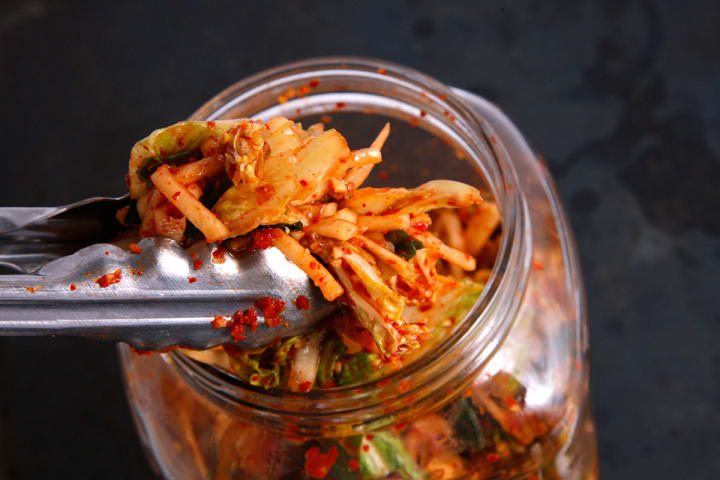
Kimchi, a traditional Korean side dish, is a sweet and sour dish made by fermenting cabbage, cucumber, or radish. As a food that’s primarily made from pickled vegetables, kimchi is not only a great probiotic food, it’s also a great source of fiber. Consuming kimchi has also been linked to a boost in immune system regulation. If you can handle the spice, eating kimchi will also give you extra beta-carotene, calcium, iron, and a multitude of vitamins. As a side dish, you can use kimchi to make sandwiches, stir-fries, or soups, but just be sure to make sure that you don’t overcook and destroy the useful bacteria.
Pickles
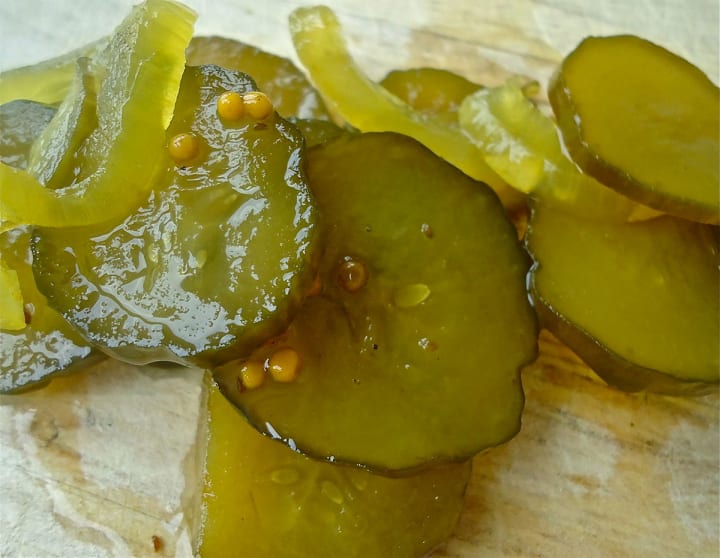
Pickles are another one of the probiotic foods you need in your diet. Those that have been brined in water and sea salt, as opposed to vinegar, are the best to seek out, as vinegar often kills the beneficial bacteria. The water and sea salt pickle juice solutions help promote growth of the beneficial bacteria. Pickle juice is also a great source of electrolytes, which can help relieve muscle cramps associated with exercise. The best news is that you probably already have tons of easy opportunities to include more pickles in your diet, including with grilled cheese sandwiches, burgers, or even hot dogs. While most pickles will be probiotically beneficial, the less commercial brands are more likely to pack a greater health punch.
Sauerkraut
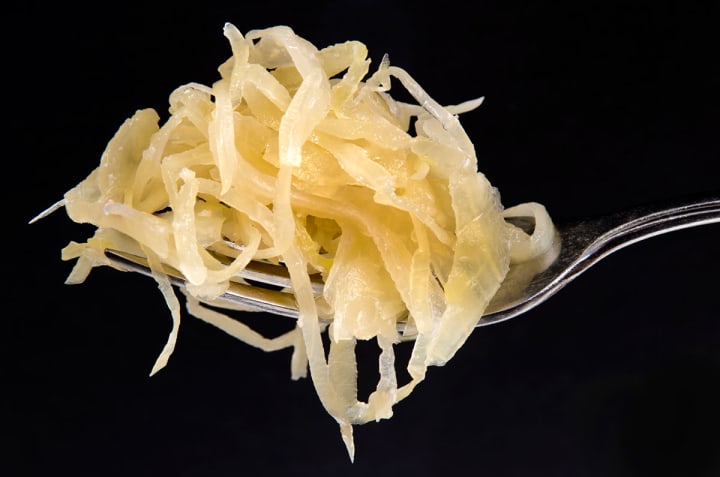
Did you know that sauerkraut is also a great probiotic option? Similar to kimchi, sauerkraut is fermented cabbage rich in healthy live bacteria cultures. While sauerkraut doesn’t have a high diversity of probiotics like kimchi, it is full of organic acids that promote healthy culture growth. The enzymes found in sauerkraut help aid in digestion. Popular in Germany, sauerkraut is a popular side dish to complement potatoes and different sausages like kielbasa and bratwursts. When choosing a sauerkraut, for best probiotic benefits doctors suggest choosing those that have not yet been pasteurized, as that process kills off the healthy cultures. For women who are pregnant, talk to a doctor before consuming unpasteurized foods.
Miso Soup

Miso soup, a popular Japanese dish, is a great source of probiotics you can turn to when looking to improve your digestive health. Miso is made from fermented rye, beans, rice, or barley and is frequently added to hot water to make a soup. The fermentation of soybeans with brown rice makes miso a rich source for lactobacillus acidophilus. Its probiotic benefits include adding new healthy cultures to your existing bacterial colonies in your gut, and helping reduce digestive imbalance symptoms such as diarrhea. The miso paste has a strong and salty flavor, meaning small amounts of it can go a long way in seasoning some of your favorite Asian dishes.
Kombucha

Staying with the Japan theme, Kombucha is a fermentation of black tea made by using a symbiotic colony of bacteria and yeast. Kombucha tea contains live bacteria colonies and is often called “mushroom-tea” because of the shape the bacteria and yeast take on as they grow within the fermented beverage. The tea has been around for thousands of years, and originated in Asia. The probiotic beverage contains sugar, has a sweet-tart flavor, and is chocked full of B vitamins, antioxidants, and remnants of alcohol that carry over from the fermentation process. The tea has been linked to not only digestive health, but also with alleviating symptoms of arthritis, making it one of the probiotic foods you need in your diet.
Cheese

Cheese is a beloved food of many, and the fact that it can help promote better digestive health is even more reason to love it. While some probiotics have difficulty surviving the trip through your stomach and intestines, the probiotic culture strains found in soft cheeses are strong enough to make it. As with other foods on this list, it is important to look for cheeses that are unpasteurized as they are the kinds that will have the healthy cultures you are looking for. Cheeses like gouda and those made from goat milk, sheep milk, or A2 cow milk are going to be your best bet for probiotics, full of cultures like thermophillus, bifudus, bulgaricus, and acidophilus. These cultures will boost your digestive health, and your immune system.
Tempeh
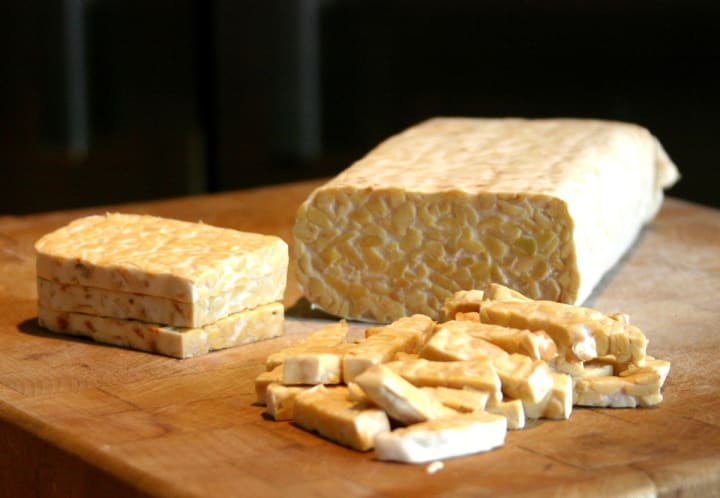
Tempeh is a food formed from fermented soybeans, similar to miso, that is absolutely one of probiotic foods you need in your diet. It is a white block that’s packed full of protein, and is frequently used as a meat substitute for vegetarians and vegans alike. This Indonesian patty of fermented soybeans is a natural antibiotic that can be used to fight off bad bacteria while also promoting the growth of healthy cultures. In addition to being used as a meat alternative when marinated, tempeh comes with a smoky, nutty flavor that is frequently described as being similar to a mushroom. While tempeh has more calories than tofu, it also comes with a greater probiotic, protein, and fiber content.
Sourdough Bread

Who says you can’t eat bread when you’re trying to eat healthy? San Francisco’s famous sourdough bread is a great option for those looking to incorporate more foods with probiotic benefits. Sourdough bread contains lactobacillus, one of the healthy cultures you should be looking to add more of to your gut. The bacteria-yeast combination found in sourdough bread allows you to pre-digest the starches found in the grains you’re eating, meaning less digestion work your gut needs to take on. Another benefit of the tangy bread is that it has a lower glycemic index, meaning it can help keep you feeling satisfied for longer. Time for a sandwich!
While some of these foods might take you a little longer to search for in the grocery store, it is relatively easy to incorporate these probiotic foods you need in your diet. Items like kombucha might require a little bravery and extra hunting on your end if you’re looking to expand out of your comfort zone and have never had the tea before. But other items, like gouda cheese and pickles, are items that you were probably already eating, and now have an even better excuse to eat more of. The key to picking great probiotic foods is to search for foods that are unpasteurized, as the pasteurization process often kills off the helpful bacteria you’re looking to consume from the probiotic foods you need in your diet.
About the Creator
James Porterson
Former obese teen turned nutritionist. Enjoys writing about staying active and proper nutrition.
Enjoyed the story? Support the Creator.
Subscribe for free to receive all their stories in your feed. You could also pledge your support or give them a one-off tip, letting them know you appreciate their work.






Comments
There are no comments for this story
Be the first to respond and start the conversation.